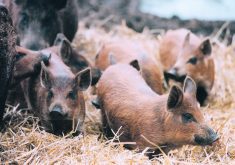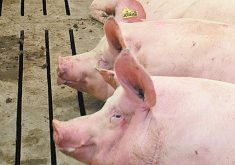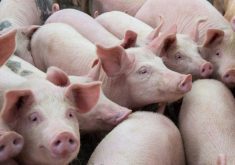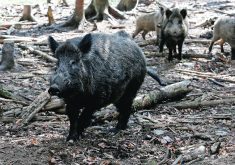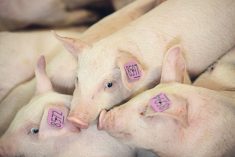African swine fever has yet to be found in Canada and a $45 million investment by the federal government announced late last month is hoping to keep it that way to prevent devastating impacts to the hog industry.
“It all comes back to the preparation and prevention of ASF,” said Gary Stordy, spokesperson for the Canadian Pork Council.
That includes protecting the country’s $5 billion hog industry which, if the disease is found, could leave countless animals without export markets, in an industry that exports 70 percent of its live and processed pork products.
Read Also

Research looks to control flea beetles with RNAi
A Vancouver agri-tech company wants to give canola growers another weapon in the never-ending battle against flea beetles.
The bulk of the funding will go toward enhancing biosecurity, wild pig management, retrofitting abattoirs and research with nearly $20 million being used for surveillance and development of a vaccine against ASF. A little more than $2 million will go toward border controls including deploying sniffer dogs that can detect pork products.
ASF was first diagnosed in its namesake continent more than 100 years ago before spreading to Western European countries in the latter half of the 20th century and the eastern portion of the continent in the early 2000s.
ASF hit China in 2018, resulting in tens of thousands of hogs being culled in that country.
Stordy said there are those in the industry who fear it’s not a question of if the disease will hit Canada but when.
“All of these preparation efforts and preventive measures are trying to reduce that chance of having it,” said Stordy. “This is something that could essentially wipe out the Canadian pork industry.”
Exports of live hogs and processed pork products would immediately cease on detection of a Canadian case of ASF, Stordy said.
“We have no capacity to hold onto animals and or store the meat for a period of time,” he said.
“We raise animals in barns for a reason. We don’t want them outside so we don’t have that flexibility as other sectors.”
Wild boars are considered a threat to domesticated hogs and there are few controls available to stem the spread of the invasive species. ASF can be spread through hog populations by animals that ingest infected pork products, contact with hogs with the disease and through ticks.
Stordy also highlighted the threat of the disease being brought into the country through infected meat products from areas of the world that have a high prevalence of ASF.
While the disease is not harmful to humans, in can be found in meat products for years after being processed.
“The biggest threat for producers is a lapse of biosecurity at the farm level,” said Stordy, stressing the need for prevention on the ground.
The use of sniffer dogs at airports and border crossings is something Stordy had high praise for in stopping the illegal importation of pork products.
“The success with these dogs finding meat products that shouldn’t be brought into Canada is phenomenal,” he said, adding corresponding fines are being leveled against offenders. “We’re vulnerable and the government is trying to close those gaps.”
Stordy said Canada is in a better position than it’s been in the past decade, ramping up efforts considerably in the last few years.
“That doesn’t mean we’re done,” he said. “There are still a lot more things we have to do to be prepared and it’s going to be an ongoing journey.”






